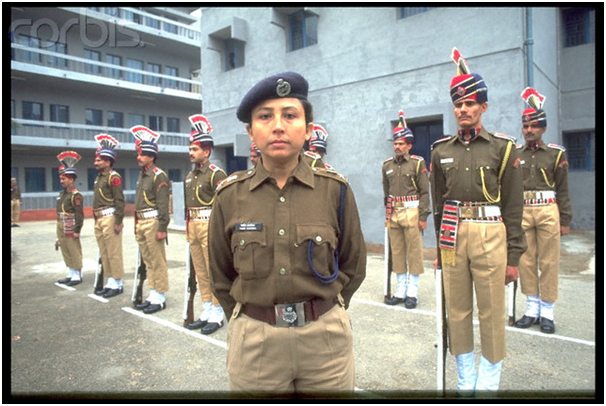In Memory Of Assam's Top Woman Cop
Yamin Hazarika

GUWAHATI: “The memory of us riding horses and watching polo matches in Delhi. . .” Sixteen years after her mother, Yamin Hazarika’s death, Huma Hazarika Sharma recalls one of the most vivid memories of their ‘together moment’. She was just 13 and her brother, Vikram, nine, when their mother lost the battle to cancer. But all she remembers of her “strict disciplinarian yet fun-loving” mother are moments of a life lived with honesty, bravado, and a warmth that touched whoever came in touch with her.
It was a part of Yamin’s constant effort, in fact, that her children were never really aware of their mother’s life in uniform. Her exemplary achievements made her a trendsetter in her home state of Assam and an icon for future generations. Yamin Hazarika was Assam’s first woman to have joined the central police force after clearing the civil service exam—twice. She was a 1977 batch DANIPS (NCT of Delhi, Andaman and Nicobar Islands, Lakshwadeep, Daman & Diu, Dadra & Nagar Haveli Police Service) and was the Assistant Commissioner of Police in charge of three high profile police stations including Chanakyapuri during the Emergency period, after the assassination of then prime minister Indira Gandhi.
Yamin’s colleagues at work remember her as a dedicated professional, one who handled all work related pressure with a calm head and an unbiased attitude. “Even today some of her former colleagues say that they have some of their fondest memories with her. She was a disciplinarian and was fair to everyone,” Huma says.
“But Inoo had always been like that,” Yamin’s sister, Yasmin Ahmed recalled her sister’s memories, referring to her in her pet name. “In our ancestral home in Lakhtokia I remember we were 17 cousins. You can imagine the noise we must have created! But Inoo would play by herself, quiet and calm unlike me or the rest of us”.
Born in the late 1950s to Shameem Hazarika and Mohammad Serajul Hazarika, Yamin was second of five siblings.
Renowned author Mamang Dai, Yamin’s school friend from when they studied together in Pine Mount, Shillong, revealed another facet of her feisty school mate in a piece she had written for The Thumb Print magazine. “She was a bit of a daredevil as we formed a secret society with a hideout dubbed the Falcon’s Nest located on the ceiling above the dormitory. Study was the last thing on our minds, but Yamin was a constant scorer of good marks in all subjects, and a rarity for me, scored in Maths too,” she wrote.
Noted journalist Sanjoy Hazarika, another long time friend of Yamin’s from their school days in Shillong, similarly recalled her positive demeanour throughout her life. “She was always smiling, always cheerful. She was...very Yamin”.
As she grew, Yamin’s dream of cracking the civil service exam became firm, and with the support of her parents, she realized it. “In fact it was because of a delay in the results that she appeared for the exam the second time. Turned out, she cleared both the times!” Yasmin says.
Calling her “helpful and high-spirited”, Yasmin says that her sister was a good mother above all. “When I used to visit her in Delhi, I remember she would squeeze out fresh orange juice for her children and keep it in the fridge before wearing her uniform and heading to work. She had an orderly at her disposal but did everything on her own—bathing the children, even combing their hair—in the morning,” she says.
Reminiscing her daughter’s memories, Yamin’s octogenarian mother quoted one of their many conversations about her juggle between work and family. “I have to go for my duty with the kids hanging around my neck!” she had once told her mother.
Nellie Ahmed Tanweer, Yamin’s cousin who was close to her, fondly remembers her passion for reading. “She was an avid reader and you could find books of Ayn Rand to Mills and Boon in her chamber,” she says.
Huma also recalls her mother as being a very social person, one who was culturally inclined and made sure her kids grew in such an environment. “We would go for plays and music recitals, and grew up around authors and social activists, like Vikram Seth, Arundhati Roy, Sanjoy Hazarika, all of who were mum’s friends”.
She also ensured the children grew without harbouring any biases. “I remember going to our maid’s son’s birthday party. It was no big deal,” Huma says. “Also, because my mother married a non-Muslim, a Hindu Brahmin, we had a liberal upbringing. She never imposed anything on us, guiding us instead to choose right over wrong”.
Her parents however separated when they were still young, and Huma recalls her mother donning the role of both parents. “She was however careful not to overindulge us”.
A year before her death—Yamin was only 43—she had expressed a desire to adopt a baby girl, Huma reveals. “She used to visit orphanages...but fate had other plans”. Yamin was in Bosnia as part of her stint in the UN peacekeeping force when her disease was detected.
Her life may have been cut short but sixteen years later, today, Yamin Hazarika’s story continues to inspire many. As the deputy commissioner of police in charge of crime against women cell and personally too, she was a champion of women’s causes. In recognition of her efforts, the Yamin Hazarika Memorial Woman of Substance Award was constituted by Women’s Hub, a network of professional women, and was conferred upon journalist and author, Indrani Raimedhi at a memorial meeting in Guwahati this July 24.
Here’s to Assam’s icon, a trailblazer in every sense.
(Azera Parveen Rahman is a freelance writer and copy-editor. She writes mostly on development issues and has been awarded two national awards in the past—the United Nations Population Fund (UNFPA)-Laadli Media Award for Gender Sensitivity in 2010, and the Anupama Jayaraman Memorial Award for the Most Promising Young Woman Journalist, 2008).



